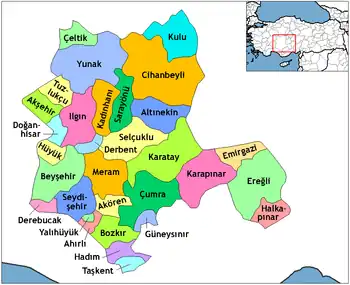Ereğli | |
|---|---|
District and municipality | |
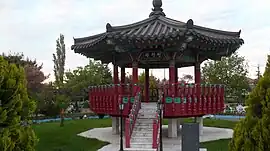 Kwangjin Park in Ereğli | |
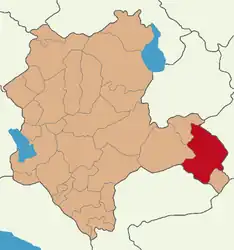 Map showing Ereğli District in Konya Province | |
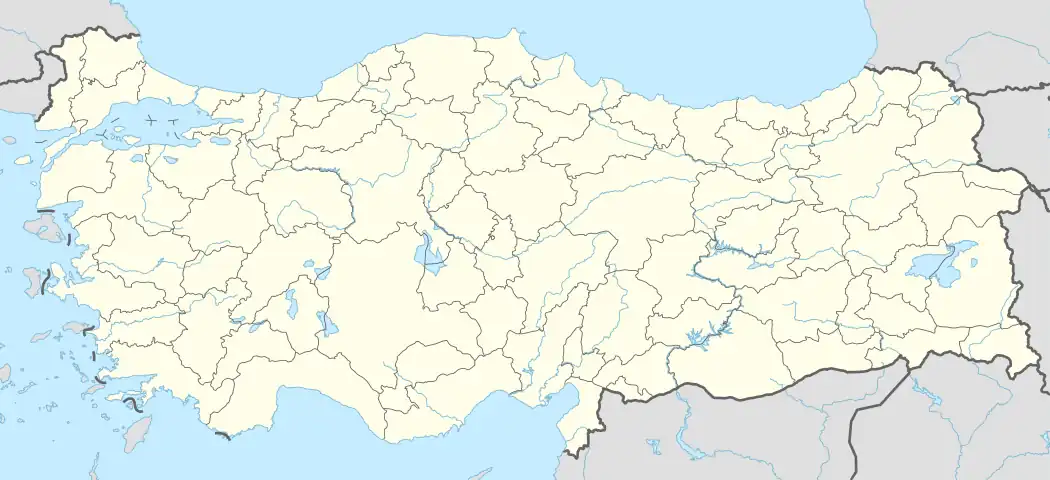 Ereğli Location in Turkey 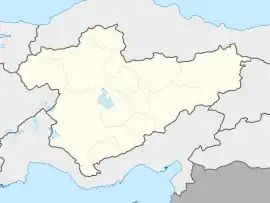 Ereğli Ereğli (Turkey Central Anatolia) | |
| Coordinates: 37°30′46″N 34°02′54″E / 37.51278°N 34.04833°E | |
| Country | Turkey |
| Province | Konya |
| Government | |
| • Mayor | Hüseyin Oprukçu (MHP) |
| Area | 2,214 km2 (855 sq mi) |
| Elevation | 1,038 m (3,406 ft) |
| Population (2022)[1] | 150,978 |
| • Density | 68/km2 (180/sq mi) |
| Time zone | TRT (UTC+3) |
| Area code | 0332 |
| Website | www |
Ereğli is a municipality and district of Konya Province, Turkey.[2] Its area is 2,214 km2,[3] and its population is 150,978 (2022).[1] Its elevation is 1,038 m (3,406 ft).[4]
History
The ancient town of Heraclea Cybistra (Ηράκλεια Κυβίστρα in Ancient Greek) was located here, and gave its name (Heracles) to the modern town. The town had some importance in Hellenistic times owing to its position near the point where the road to the Gülek Pass (Cilician Gates) enters the hills. It lay in the way of armies and was more than once sacked by the Arab invaders of Asia Minor (AD 805 and 832). During the Crusade of 1101 it was the scene of a failed battle of 15,000 men led by William II, Count of Nevers against the Seljuks, which left the Crusaders weak en route to Antioch.[5] It became Turkish (Seljuk) in the 11th century.
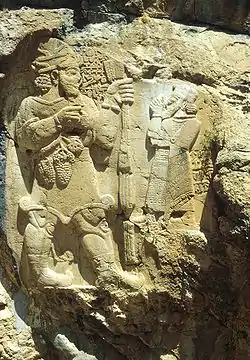
Ereğli is also known for being the first capital of the Karaman Beylik founded by Nur Sufi Bey. The Karaman state was renowned for being a consistent nuisance to Ottoman dominance in Anatolia, being one of the few Anatolian beyliks to retain sovereignty well past Mehmed the Conqueror's conquest of Constantinople. It was also the first political entity and beylik in Anatolia to proclaim Turkish as an official language alongside Arabic and Persian. In 1553, upon return from a campaign in Persia, Suleiman the Magnificent had his son, Şehzade Mustafa, killed in the Ereğli valley where the Ottoman Army was stationed. Modern Ereğli had grown from a large village to a town since the railway reached it from Konya and Karaman in 1904; and it has now hotels and thriving businesses.
Archaeology
Three hours’ ride south is the famous "Hittite" rock relief of a lynx, representing a king (probably of neighbouring Tyana) adoring a god. This was the first "Hittite" monument discovered in modern times (early 18th century, by the Swede Otter, an emissary of Louis XIV).
Ereğli may be the location of the Hittite town of Hupisna (Ḫupišna), where the goddess Ḫuwaššanna was worshipped. She was linked with Gazbaba, a Mesopotamian love goddess also connected with Inanna.
In the early Iron Age, Hupisna also was a neo-Hittite polity in the land of Tabal. Two kings of Hupisna are known from the Assyrian sources: Puḫamme (c. 837 BC) and Urimme (c. 738 BC).[6][7]
Composition
There are 87 neighbourhoods in Ereğli District:[8]
- 500 Evler
- Acıkuyu
- Acıpınar
- Adabağ
- Akhüyük
- Alhan
- Alpaslan
- Aşağıgöndelen
- Aşıklar
- Atakent
- Aydınlar
- Aziziye
- Bahçeli
- Barbaros
- Batıalagözü
- Belceağaç
- Belkaya
- Beyköy
- Beyören
- Boyacıali
- Bulgurluk
- Burhaniye
- Büyükdede
- Cahı
- Çakmak
- Camikebir
- Çayhan
- Çiller
- Çimencik
- Cinler
- Çömlekçi
- Dalmaz
- Doğualagözlü
- Eti
- Fatih
- Gaybi
- Gökçeyazı
- Göktöme
- Gülbahçe
- Hacımemiş
- Hacımustafa
- Hacımutahir
- Hamidiye
- Hıdırlı
- Hortu
- Kamışlıkuyu
- Karaburun
- Kargacı
- Kazancı
- Kızılgedik
- Kuskuncuk
- Kutören
- Kuzukuyu
- Mehmet Akif
- Mellicek
- Mimar Sinan
- Namık Kemal
- Orhangazi
- Orhaniye
- Özgürler
- Pınarözü
- Pirömer
- Sarıca
- Sarıtopallı
- Selçuklu
- Servili
- Şinasi
- Sümer
- Talatpaşa
- Taşağıl
- Taşbudak
- Tatlıkuyu
- Toros
- Türbe
- Türkmen
- Üçgöz
- Ulumeşe
- Yazlık
- Yellice
- Yenibağlar
- Yeniköy
- Yıldırımbeyazıt
- Yıldızlı
- Yukarıgöndelen
- Yunuslu
- Zengen
- Ziya Gökalp
Climate
Ereğli has a cold semi-arid climate (Köppen: BSk),[9] with hot, dry summers, and cold winters.
| Climate data for Ereğli, Konya (1991–2020) | |||||||||||||
|---|---|---|---|---|---|---|---|---|---|---|---|---|---|
| Month | Jan | Feb | Mar | Apr | May | Jun | Jul | Aug | Sep | Oct | Nov | Dec | Year |
| Mean daily maximum °C (°F) | 5.9 (42.6) |
8.1 (46.6) |
13.4 (56.1) |
18.7 (65.7) |
23.9 (75.0) |
28.6 (83.5) |
32.3 (90.1) |
32.2 (90.0) |
28.0 (82.4) |
21.6 (70.9) |
13.7 (56.7) |
7.6 (45.7) |
19.6 (67.3) |
| Daily mean °C (°F) | 0.3 (32.5) |
2.0 (35.6) |
6.9 (44.4) |
11.8 (53.2) |
16.6 (61.9) |
20.9 (69.6) |
24.2 (75.6) |
23.8 (74.8) |
19.4 (66.9) |
13.7 (56.7) |
6.7 (44.1) |
2.1 (35.8) |
12.4 (54.3) |
| Mean daily minimum °C (°F) | −4.0 (24.8) |
−3.1 (26.4) |
0.8 (33.4) |
5.1 (41.2) |
9.4 (48.9) |
13.2 (55.8) |
15.7 (60.3) |
15.3 (59.5) |
11.0 (51.8) |
6.4 (43.5) |
0.8 (33.4) |
−2.2 (28.0) |
5.7 (42.3) |
| Average precipitation mm (inches) | 33.11 (1.30) |
28.31 (1.11) |
33.91 (1.34) |
37.02 (1.46) |
34.15 (1.34) |
26.1 (1.03) |
6.46 (0.25) |
5.1 (0.20) |
10.36 (0.41) |
22.11 (0.87) |
29.26 (1.15) |
39.58 (1.56) |
305.47 (12.03) |
| Average precipitation days (≥ 1.0 mm) | 5.8 | 5.4 | 6.1 | 6.7 | 6.0 | 3.9 | 1.9 | 1.6 | 2.5 | 3.6 | 4.7 | 6.4 | 54.6 |
| Average relative humidity (%) | 77.0 | 71.4 | 62.4 | 58.3 | 57.0 | 52.0 | 45.2 | 47.1 | 51.9 | 61.0 | 70.1 | 77.4 | 60.9 |
| Mean monthly sunshine hours | 98.8 | 128.5 | 183.9 | 224.4 | 278.1 | 325.4 | 361.4 | 343.3 | 282.2 | 209.1 | 144.2 | 91.4 | 2,670.7 |
| Source: NOAA[10] | |||||||||||||
Transportation
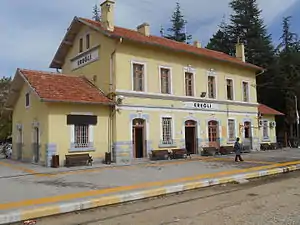
Ereğli Gar is the railway station of the town. Once served by several train lines that have destinations to Istanbul, İzmir and Konya, the station is currently served by Mainline / Toros Ekspresi only, which connects Ereğli to Adana and Karaman.
Notable residents
- Nimet Çubukçu, current Minister of Education of Turkey.
- Ali Talip Özdemir, former head of the Motherland Party (ANAP)
- Şehzade Mustafa, heir to the Ottoman throne who was killed in the Ereğli valley
- Volkan Ş. Ediger (born 1953, is a scientist, writer and bureaucrat
International relations
Ereğli is twinned with:
See also
- Kwangjin Park, a park in Ereğli.
References
- 1 2 "Address-based population registration system (ADNKS) results dated 31 December 2022, Favorite Reports" (XLS). TÜİK. Retrieved 19 September 2023.
- ↑ Büyükşehir İlçe Belediyesi, Turkey Civil Administration Departments Inventory. Retrieved 19 September 2023.
- ↑ "İl ve İlçe Yüz ölçümleri". General Directorate of Mapping. Retrieved 19 September 2023.
- ↑ Falling Rain Genomics, Inc. "Geographical information on Ereğli, Turkey". Retrieved 26 September 2023.
- ↑ Richard, Jean (16 September 1999). The Crusades, C. 1071-c. 1291. Cambridge University Press. p. 73. ISBN 0-521-62566-1.
- ↑ Trevor Bryce: The World of the Neo-Hittite Kingdoms; A Political and Military History. Oxford, New York 2012, pp. 153, 271.
- ↑ Christian Marek, Peter Frei: Geschichte Kleinasiens in der Antike. München 2010, p. 802.
- ↑ Mahalle, Turkey Civil Administration Departments Inventory. Retrieved 19 September 2023.
- ↑ "Table 1 Overview of the Köppen-Geiger climate classes including the defining criteria". Nature: Scientific Data.
- ↑ "World Meteorological Organization Climate Normals for 1991-2020 — Ereğli". National Oceanic and Atmospheric Administration. Retrieved January 15, 2024.
- ↑ "Twinnings" (PDF). Central Union of Municipalities & Communities of Greece. Archived from the original (PDF) on 2016-01-15. Retrieved 2013-08-25.
External links
- District governor's official website (in Turkish)
- District Municipality's official website (in Turkish)
